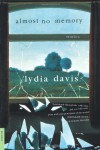Currently reading
Almost No Memory
Selected Poems
The Tiger's Wife
Charles Dickens (Penguin Lives)
The Mansion of Happiness
Schriften
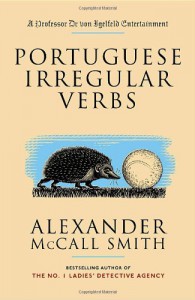 A light, humorous book about a German doctor of philology, if that makes sense. While parts were very funny, especially at the beginning, it lost steam as it developed. Though it didn't actually "develop." Mostly it just cast a pretentious German PhD into silly situations meant to poke fun at pretentious Germans PhDs who don't know how to act or react outside Germany, which could be really funny, but was somehow never quite funny enough.
A light, humorous book about a German doctor of philology, if that makes sense. While parts were very funny, especially at the beginning, it lost steam as it developed. Though it didn't actually "develop." Mostly it just cast a pretentious German PhD into silly situations meant to poke fun at pretentious Germans PhDs who don't know how to act or react outside Germany, which could be really funny, but was somehow never quite funny enough.
 1
1
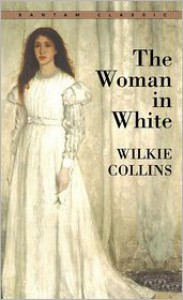 Greed, spite, schemes, hypochondria, spying, lying, dying, conniving, oily counts, feminine facial hair, cockatoos, volcanic ardor, sickbeds, white mice, arson, deceit, stupidity, feeble-mindedness, marriage, watercolors, estates, thuggery, immense necessity, honor, sordid particulars, gravestones, paternity, secrets, villainy, obesity, epistles, death, heroism, loss, wine, song, assault, clandestine meetings, servants - all as if someone had turned a camera on the heart.
Greed, spite, schemes, hypochondria, spying, lying, dying, conniving, oily counts, feminine facial hair, cockatoos, volcanic ardor, sickbeds, white mice, arson, deceit, stupidity, feeble-mindedness, marriage, watercolors, estates, thuggery, immense necessity, honor, sordid particulars, gravestones, paternity, secrets, villainy, obesity, epistles, death, heroism, loss, wine, song, assault, clandestine meetings, servants - all as if someone had turned a camera on the heart.Not wanting to leave it behind, I watched an adaptation on YouTube: http://www.youtube.com/watch?v=TAMJUc851Nw
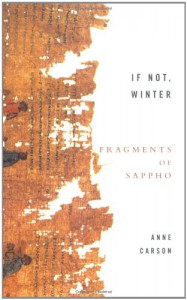 It makes me uneasy to be underwhelmed by a book the rest of the planet rates very highly, but underwhelmed I was. I am neither a Greek scholar nor have I read Sappho previously, so maybe this was the wrong place to start.
It makes me uneasy to be underwhelmed by a book the rest of the planet rates very highly, but underwhelmed I was. I am neither a Greek scholar nor have I read Sappho previously, so maybe this was the wrong place to start. There were definitely some good fragments in the book, but a lot of the time I was having an emperor's-new-clothes experience. For example, one page has the fragment:
sinful
Another page says -
]
]all
]but different
]hair
]
The ]s represent places in the original Sappho where the papyrus is destroyed or illegible. There are fuller pages than these, and many of the poems and fragments are supplemented by end notes, which are in part explanatory.
I do like the frequent violets, and the "dripping (pain)" but give me Emily Dickinson any day.
 1
1
 I enjoyed the movie so much that -although I once decided to skip this book- I gave in and read it. I wasn't disappointed, also because, as usual, there's more to the book than the movie. Great story, though the Wennestrom thread became a tad tedious at the end, and of course the whole Harriet/Sweden ending was contrived. Still, much enjoyed. So glad I put aside the suburban US melodrama I was reading before picking this up.
I enjoyed the movie so much that -although I once decided to skip this book- I gave in and read it. I wasn't disappointed, also because, as usual, there's more to the book than the movie. Great story, though the Wennestrom thread became a tad tedious at the end, and of course the whole Harriet/Sweden ending was contrived. Still, much enjoyed. So glad I put aside the suburban US melodrama I was reading before picking this up.
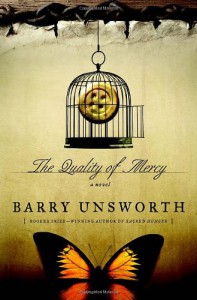 Unsworth is a good storyteller, and his prose is excellent. I did feel, however, that some of the characters is this book were rather cardboard. I also think that any book that ends with the phrase "dream of freedom" has failed itself.
Unsworth is a good storyteller, and his prose is excellent. I did feel, however, that some of the characters is this book were rather cardboard. I also think that any book that ends with the phrase "dream of freedom" has failed itself.
 1
1
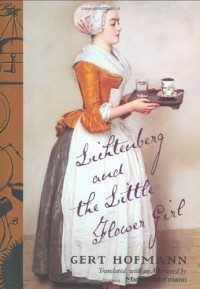 I really love Lichtenberg, my favorite aphorist. I would only recommend this book to anyone who is likewise inclined to him, as it wouldn't likely hold interest for people with no knowledge of his life or collected aphorisms [b:The Waste Books|984015|The Waste Books|Georg Christoph Lichtenberg|http://d202m5krfqbpi5.cloudfront.net/books/1343788385s/984015.jpg|969510]. This fictionalized phase of his life, in which he lives with a teenage girl as common wife, was charming and is based on truth. At first I thought it romanticized, and I can't say that isn't so not having been there. But as someone interested in German thinkers, I much enjoyed it.
I really love Lichtenberg, my favorite aphorist. I would only recommend this book to anyone who is likewise inclined to him, as it wouldn't likely hold interest for people with no knowledge of his life or collected aphorisms [b:The Waste Books|984015|The Waste Books|Georg Christoph Lichtenberg|http://d202m5krfqbpi5.cloudfront.net/books/1343788385s/984015.jpg|969510]. This fictionalized phase of his life, in which he lives with a teenage girl as common wife, was charming and is based on truth. At first I thought it romanticized, and I can't say that isn't so not having been there. But as someone interested in German thinkers, I much enjoyed it.
 After 150 pages I decided if this book didn’t end by smashing the patriarchy, I didn’t want to read anymore. And since it would end in 1642, I gave up. Say what you will about ‘the times,’ it’s impossible to buy the idea that a well-off, well-educated, intelligent and self-respecting public figure can’t know he’s participating in screwing over half of humanity.
After 150 pages I decided if this book didn’t end by smashing the patriarchy, I didn’t want to read anymore. And since it would end in 1642, I gave up. Say what you will about ‘the times,’ it’s impossible to buy the idea that a well-off, well-educated, intelligent and self-respecting public figure can’t know he’s participating in screwing over half of humanity. Back in the days of Galileo, the author tells us, it was atypical for (male) academics to marry. And so it was with Galileo and his contemporaries, who didn’t marry but nevertheless enjoyed living in conjugal union with someone from the grateful lower classes, and begetting bastard children with them, despite being “devout” Catholics and, in Galileo’s case, personal friends with the freaking Pope.
Now if one of your children is a boy, you might, like Galileo, go to the trouble of getting him legitimatized through your political and clerical (hypocritical) relationships, even though he is a sullen and not terribly sharp child. If the other children are girls, bright and dutiful as they may be, put those inconvenient lesser beings in a convent, which operates like an adult orphanage, a workhouse made up of cast-off daughters who live in poverty, as they would in any poorhouse, where they can labor for the church without further ado and through no choice of their own. What is it but a form of white slavery?
There aren’t too many books that push my feminist button so bad, but I found it all reprehensible. And to top it off the daughter in question was a fawning and overly loving person with apparently a big forgiving heart that made me want to puke. The other daughter spent her days depressed and in the convent infirmary for want of a sharp object. Quite rightly, in my book. There should be another “Galileo’s Daughter” devoted to the one who was right in the head.
If you are really have to know everything about Galileo, you’d probably like this book, which was not uninteresting. As for me, enough was enough and thank God it’s over.
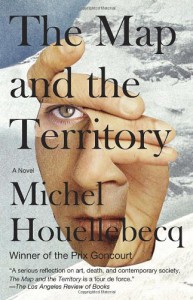 Frankly I read this because my 16-year old did, and considering the negative buzz surrounding Houellebecq I was wondering if she was polluting her beautiful young mind with misogynist pornography. I didn’t expect to like it. So it is with surprise that I bestow 5 stars upon it. A wonderful book - rich, true and wickedly funny.
Frankly I read this because my 16-year old did, and considering the negative buzz surrounding Houellebecq I was wondering if she was polluting her beautiful young mind with misogynist pornography. I didn’t expect to like it. So it is with surprise that I bestow 5 stars upon it. A wonderful book - rich, true and wickedly funny. Now that I’ve looked into Houellebecq a bit more I see this was maybe an odd place to start; his other, more misanthropic, sexually-charged books are what got him all the attention. But I don’t care. This was a very satisfying read on many levels, from the narrative style to the prose, from the originality to the humor and insight.
The main character is a painter named Jed Martin who is first launched to fame by a series he does using Michelin maps. On a trip with his father, they stop at a rest stop, where he buys a map.
“It was then, unfolding the map, while standing by the cellophane-wrapped sandwiches, that he had his second great aesthetic revelation. This map was sublime. Overcome, he began to tremble in front of the food display. Never had he contemplated an object as magnificent, as rich in motion and meaning as this 1/150,000-scale Michelin map of the Creuse and Haute-Vienne. The essence of modernity, of scientific and technical apprehension of the world, was here combined with the essence of animal life. The drawing was complex and beautiful, absolutely clear, using only a small palette of colours. But in each of the hamlets and villages, represented according to their importance, you felt the thrill, the appeal, of human lives, of dozens and hundreds of souls ...”
At some point later in the book, someone observes that the map is more interesting than the territory. Contemplating (and rendering) the world is more interesting than being involved in it.
I loved the take on the art/literary world. I enjoyed the storyline with the father, the reflections on France and society, on death, on relationships. Houellebecq bringing himself in as a character was a master stroke and revealing. I adored the rant about Picasso. The way he did himself in was marvelous. To me it was a subdued joyride of a book, not in that it was uplifting, but because the author tugged the rip cord and let it rip.
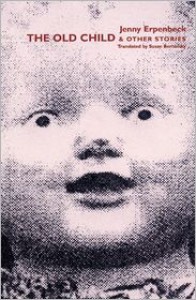 This is a fable, and the story is rather like 'Benjamin Button,' but in reverse, and way more reflective. The plot is scant. It was well written, but I found it occasionally repetitive, and I thought the writer would have done as well by lopping off 25-30 pages. I enjoyed Erpenbeck's [b:Visitation|8638226|Visitation|Jenny Erpenbeck|http://d202m5krfqbpi5.cloudfront.net/books/1348829216s/8638226.jpg|10864336] more.
This is a fable, and the story is rather like 'Benjamin Button,' but in reverse, and way more reflective. The plot is scant. It was well written, but I found it occasionally repetitive, and I thought the writer would have done as well by lopping off 25-30 pages. I enjoyed Erpenbeck's [b:Visitation|8638226|Visitation|Jenny Erpenbeck|http://d202m5krfqbpi5.cloudfront.net/books/1348829216s/8638226.jpg|10864336] more.
 So, did this account of the long wind-up to 9/11 “read like fiction,” as one of the blurbs proclaims? Well, there was a plot and strong narrative. There was intrigue. Far-flung settings, yes, and a list of characters long enough to rival "War and Peace." But at the same time, as engaging as it was, this book was above all informative, and I doubt there’s anyone who turns to fiction to be informed about events and historic developments. In no way to knock it, but “David Copperfield” it ain’t.
So, did this account of the long wind-up to 9/11 “read like fiction,” as one of the blurbs proclaims? Well, there was a plot and strong narrative. There was intrigue. Far-flung settings, yes, and a list of characters long enough to rival "War and Peace." But at the same time, as engaging as it was, this book was above all informative, and I doubt there’s anyone who turns to fiction to be informed about events and historic developments. In no way to knock it, but “David Copperfield” it ain’t. I really did appreciate this book, and (unlike fiction) it’s because I learned a lot, without getting bored in the bargain.The author has done some exhaustive homework and smoothly weaved together the story of how al-Qaeda came to be. I'd recommend this to anyone who can read.
Say what you like about motivation, political betrayal, greed, poverty, how religious fundamentalism borders on insanity, I am going to stand firmly on the side that says mass murder is wrong, no matter how justified you think you are and no matter which side you’re on.
 George Saunders is the kind of contemporary writer that reminds you how crappy too many other contemporary writers are. These were marvelous stories - the diction is spot-on, the humor is buoyant and the humanity is consoling. I will admit I preferred [b:Pastoralia|14295|Pastoralia|George Saunders|http://d202m5krfqbpi5.cloudfront.net/books/1348067120s/14295.jpg|4225], but I recommend this collection just as much.
George Saunders is the kind of contemporary writer that reminds you how crappy too many other contemporary writers are. These were marvelous stories - the diction is spot-on, the humor is buoyant and the humanity is consoling. I will admit I preferred [b:Pastoralia|14295|Pastoralia|George Saunders|http://d202m5krfqbpi5.cloudfront.net/books/1348067120s/14295.jpg|4225], but I recommend this collection just as much. My favorite of these was "Escape from Spiderhead," followed by "Tenth of December." The weakest one for me was also the shortest - "Sticks."
 I've read a number of reviews praising this book especially for its war scenes. I wish I'd gotten that far! The ooey-gooey sex did me in - how Isabelle realized she was "born" to have sex with Stephen, to be "impaled" by him, and to feel his "sticky seed" between her legs. I mean, c'mon folks. SOOOOO many other better books to read. Sorry I missed the war scenes, though.
I've read a number of reviews praising this book especially for its war scenes. I wish I'd gotten that far! The ooey-gooey sex did me in - how Isabelle realized she was "born" to have sex with Stephen, to be "impaled" by him, and to feel his "sticky seed" between her legs. I mean, c'mon folks. SOOOOO many other better books to read. Sorry I missed the war scenes, though.
 1
1
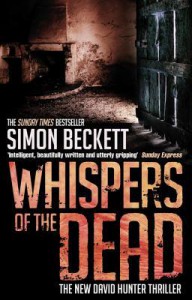 Listened to this in the car on a long trip. That makes three (audio-) books I've listened to by Beckett - all engaging and gruesome on completely over the top. I'd say, however, this was the weakest of the three.
Listened to this in the car on a long trip. That makes three (audio-) books I've listened to by Beckett - all engaging and gruesome on completely over the top. I'd say, however, this was the weakest of the three.
 [bc:The Piano Teacher|764953|The Piano Teacher|Elfriede Jelinek|http://d.gr-assets.com/books/1327932142s/764953.jpg|2179325] This is a book that depends on the inner life of the characters and the terrible dynamic between them to drive the story, and the writer’s language to sustain that hurtling energy. For all its very voyeuristic aspects, I don’t quite get how it could succeed as a movie. And I won’t find out because I think it would be awful to watch, despite how much I admire this book, and despite how fetching Isabelle Huppert looks on the cover of my copy.
[bc:The Piano Teacher|764953|The Piano Teacher|Elfriede Jelinek|http://d.gr-assets.com/books/1327932142s/764953.jpg|2179325] This is a book that depends on the inner life of the characters and the terrible dynamic between them to drive the story, and the writer’s language to sustain that hurtling energy. For all its very voyeuristic aspects, I don’t quite get how it could succeed as a movie. And I won’t find out because I think it would be awful to watch, despite how much I admire this book, and despite how fetching Isabelle Huppert looks on the cover of my copy. I read [bc:Wonderful, Wonderful Times|301834|Wonderful, Wonderful Times|Elfriede Jelinek|http://d.gr-assets.com/books/1328705084s/301834.jpg|292898] a year ago and it was similar in its deep bleakness. The writing was also excellent but I didn’t like it half as much as The PianoTeacher, mostly because I managed to feel a cake crumb of sympathy and understanding for the twisted main character in the latter, Erica Kohut. The characters in WWT seemed too remote.
Until I had finished I didn’t realize that The Piano Teacher was semi-autobiographical. Elfriede Jelinek lived alone with her mother, her father died in an asylum, she graduated from the Vienna school of music, and obviously has as much trouble navigating the manifest world as Erica Kohut, Jelinek having been unable to leave her apartment to collect the Nobel Prize for Literature because of a generous anxiety level.
This book is not for the weak-stomached or those who like their books uplifting. Nothing uplifting in here! Just the way I like it.
 1
1
